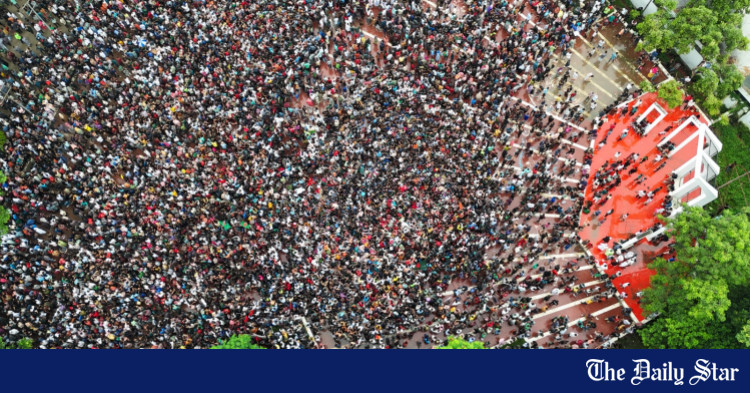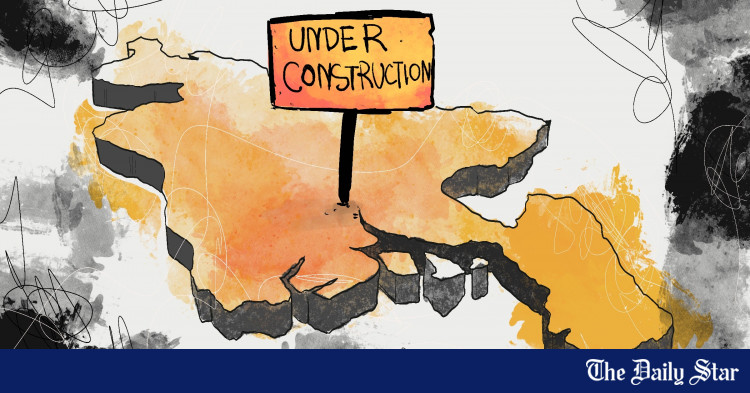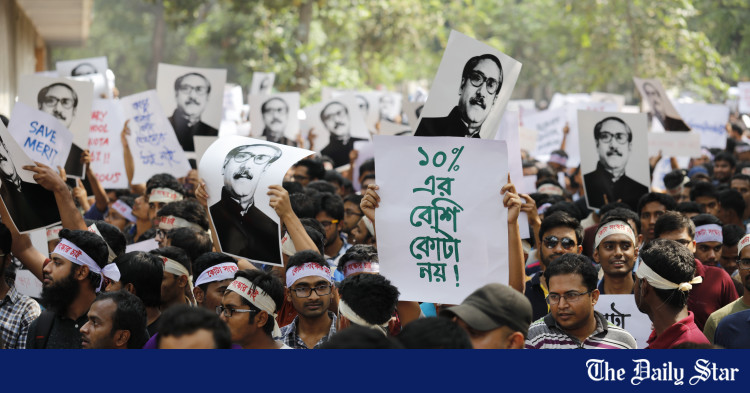'We must not lose focus from real political barriers'
Badruddin Umar, a leading Marxist intellectual, political analyst, and activist, talks about the recent student-led mass uprising and what lies in the political future of Bangladesh in an interview with Ananta Yusuf, Priyam Paul, and Shamsuddoza Sajen of The Daily Star.
How has the recent mass uprising managed to succeed despite facing significant repression from state machinery?
Several mass movements have taken place in Bangladesh in the past, such as the ones in 1952, 1969, 1971 and 1990. The one we experienced this year probably faced even more repression than the 1969 Mass Uprising in then East Pakistan. We have been up against corruption since 1972, and Sheikh Hasina’s tenure since 2008 offered more of the same. However, the Awami League’s rule of 15 and a half years can be questioned in more ways than one.
Sheikh Hasina’s authoritarian rule was supported by factors such as the army, police and judiciary. Because of that, the Awami League suffered as an organisation. In addition, leading representatives of the party were given licence to loot the country. It led to the party turning into a fraudulent and untrustworthy one. In fact, it ultimately led to party officials and workers not prioritising political mandates and promises. Some Awami League politicians functioning at the union and village levels earned crores of taka during Hasina’s reign. It’s unheard of. The former prime minister’s personal assistant is said to have amassed a fortune of over $30 million.
Hasina took dynasty politics to levels we could not have ever imagined. What happened to Sheikh Mujib’s former residence was unfortunate. But I would say that Sheikh Hasina is partly responsible for the incident.
Regressive taxes were implemented quite strictly and the middle and lower classes in the country suffered. People residing in rural areas were especially affected. Millions of dollars were transferred abroad. It’s akin to stealing money directly from the general public’s bank accounts. On top of the obvious financial scams, freedom and democracy were at an all-time low in Bangladesh. The student-led demonstration was a reaction to the overall situation; it was not confined to the demand for quota reform. Sheikh Hasina did not want to compromise, and that was one of the reasons why the Awami League was ousted. The situation had improved after legal changes were initiated following the initial protests. But power corrupts, and the Sheikh Hasina government did not negotiate with the students as it should have.
Incidents in July proved that law enforcement agencies cannot put a lid on a widespread mass movement in the country. Awami League should not have ordered its student wing, Bangladesh Chhatra League, to take part in violent ripostes. Former minister Obaidul Quader was apparently instrumental in inciting them.
Do you believe this popular uprising will substantially change the country’s political, economic and social arenas?
I do not think radical political changes will take place in the future. But I do believe that it will be difficult for another authoritarian government to come to the centre. The way leading Awami League personalities ravaged the country is quite shameful. It never happened before. Most of the preceding MPs were businessmen first, before being politicians. Although I look forward to the future, I am not sure that the political changes that we need will be initiated. I do not believe that our economy and education sectors will take giant leaps forward in the coming years.
It remains to be seen what steps the interim government, Bangladesh Nationalist Party (BNP) and other leading political parties will take. Some may not like the BNP, but it is still one of the strongest parties in the country and will definitely look to join in during election time. BNP and Jamaat-e-Islami have supported the student movement, but they will look for legitimate political power following Dr Muhammad Yunus’s tenure.
Hasina took dynasty politics to levels we could not have ever imagined. What happened to Sheikh Mujib’s former residence was unfortunate. But I would say that Sheikh Hasina is partly responsible for the incident. Sheikh Mujib’s name and family affiliations have been utilised for political projects which have not been backed with the required resources. The Awami League’s corrupt run tarnished Sheikh Mujib’s legacy. She should have paid heed to her father’s reputation and realised that it was her in power, not her father. Using Mujib’s pictures at every meeting and Bangladesh embassies created a narrative that linked Awami League’s looting with Sheikh Mujib’s international stature.
One must also understand that India’s relations are not with Bangladesh, but with the Awami League. The BJP-led government has openly declared its alliance with the Awami League. Sheikh Hasina never ignored India’s demands, and that is why the country provided her shelter after her ousting. India’s Minister of External Affairs S Jaishankar spoke in parliament about the political scenario in Bangladesh. Jaishankar did not stress upon the number of lives that were lost during the movement, instead focusing on matters that are prioritised by his government.
It is difficult for Bangladesh to not pay heed to India. Similarly, India tries to maintain good relations with Bangladesh as the former does not have strong bonds with most of its neighbours. Thus, India will play its cards according to future political developments in Dhaka. New Delhi is definitely considering how to interact with the Awami League amid the political upheaval. Without a doubt, the imperialist powers will have inputs of their own as well.
Will the fate of the Awami League mirror that of the Muslim League, or is a resurgence possible?
I do not think the Awami League can make a comeback. Sheikh Hasina was the cult figure who represented the party. With her leaving the country under circumstances that were honestly completely unexpected, it is difficult to foresee a hasty return to mainstream politics for the party. The sad truth is that a number of important Awami League leaders were just not fit for modern-day politics. Muslim League’s decline was marked by its inability to adapt to the changing political landscape of Bangladesh, and that is exactly what the Awami League experienced. Will Awami League be able to win seats legally if they take part in elections today? I do not think so.
Awami League emerged in the 1950s and was in focus in 1954, when the government of the United Front (also known as a Awami League-led coalition) fell in the then East Pakistan (now Bangladesh). Following this, the party’s structure was worked upon for more than a decade. By 1969, Awami League was organised and two years later, in 1971, it was politically relevant and supported by the masses. The movement in 2024 is like the one in 1952 in that, at its core, it is not driven by political parties per se.
The fact that the 2024 movement was mostly student-backed and not initiated by political parties does bring to the table some problems. Dr Yunus, the leader of the interim government, is not a political personality. I have written about Dr Yunus and Grameen Bank in the past. The US supports his micro-credit programme firmly, but real changes come with effective political reforms. Dr Yunus also has the backing of renowned international organisations.
Our current cabinet members are up against a political vacuum. The interim government faces many challenges in terms of making the political changes we actually need. Where the state structure is concerned, amending it requires constitutional and parliamentary elements to come into play. Thus, we need parliamentarians who are reliable and honest to make this happen. I am quite sceptical as to whether this will happen.
I am aware of the possibility of the formation of a student party in the future. This may be tough to achieve as the students do not yet have a strong social base like Awami League, BNP or Jamaat. I doubt whether the students will be able to achieve it, even though they have done well till now and two of them are in the current cabinet. I do believe that they will try to make it happen.
Is there a possibility of forming a new constituent assembly in the current context?
Our constitution has been amended quite a few times, and its history is controversial. The Bangladesh Constitution came from a Yahya Khan-appointed council. We all know about the 1970 election when political shifts took place. The following year, the Liberation War took place, which instilled certain political aspirations in the masses. Were those ambitions reflected in Bangladesh’s original constitution? I am not too sure.
Following independence, many personalities who were instrumental during the 1971 war were shunned. Instead, persons who were linked to the 1970 election were brought to the fore. If you ask me, it was akin to doing something illegal. It affected the contents of our 1972 constitution. In my opinion, our constitution needs to be totally revamped. This requires much political clout, which the interim government does not possess. Even if fair elections take place, will the amendments be made and accepted? It is tough to imagine.
What were the motivations behind the attacks on Hindus following the fall of Awami League regime?
After August 5, Hindus in Bangladesh have come under attack. It is deplorable and must be stopped. Muslims, too, are facing similar problems in our country. That must also be reported by the media. And the violence against Hindus in Bangladesh must not be given a political twist. Corruption and criminal activities are presently worrying everyone in Bangladesh. We must turn away from communal politics, especially during a time when our youth has sacrificed so much to see political changes take place. We must put an end to such political narratives as it is ultimately the Bangladesh brand which is being seriously affected. Ordinary Bangladeshis are secular and have been against communal politics since 1947. In recent times, the Indian government has given impetus to the notion that general Bangladeshis are anti-Hindu. Hefazat and Jamaat oppose communists and democrats in our country, not Bangladeshi Hindus. That’s an important point to consider.
We must put an end to such political narratives as it is ultimately the Bangladesh brand which is being seriously affected. Ordinary Bangladeshis are secular and have been against communal politics since 1947. In recent times, the Indian government has given impetus to the notion that general Bangladeshis are anti-Hindu.
We must not divert our attention from the real political barriers we face as a united nation. Hindus participated in the July mass movement along with Muslims. At the present juncture, we must try to mitigate differences rather than indulging in political manoeuvres of the past. Hindu-Muslim divides have impacted lives of many throughout the subcontinent for decades. Awami League came to power in 1996 with Jamaat’s support. Awami League has also collaborated with Hefazat for many years. We must be very careful, going forward, in relation to how we deal with and negotiate with such political obstacles.
What steps should be taken now to safeguard democracy?
Large-scale changes require a social revolution, which in turn calls for unwavering commitment and the right intentions. An organised political party in power is the need of the hour. Lenin was a firm believer in the solidarity of the general public. In Bangladesh, what we need right now is a platform which accommodates the demands of the masses. Such a framework needs to bring the people of Bangladesh together and truly pave the way for fundamental changes to take place. Vested interests and corruption need to be eradicated. We need to look past the politics of mistrust and misconception. Of course, it is not going to be easy.
During the 1970s and 1980s, many in Bangladesh were hopeful. In the realm of student politics, standout individuals would come forward to enter politics. Today, that is no longer the case. Most of the bright students are not optimistic about the future of Bangladeshi politics.
Student politics of the past was much more concerned with overall sociopolitical factors. Essentially, this quota reform movement was driven by opposition to the state of rights of the individual, even though it did touch upon matters related to the country. One must take into account that the quota reform movement did not initially stem from demands of progressive politics to be implemented in Bangladesh. It started as a protest against the lack of job opportunities and resonated with the public due to Awami League’s misrule since 2008. The government’s response to the protests angered the people further, and that led to a mass movement. We need student politics to attain its hopeful character of the past, where looking forward comes naturally, instead of pessimism taking over.
Since 1991, elections at the university level have been non-existent. When BNP came to the centre in 1991, student halls were invaded by its student wing. Then 1996 saw the Awami League regaining power and it led to a similar scenario in many university dormitories. This has been a recurring theme. The quota reform movement was, in part, against oppressors such as the Chhatra League.
Elections need to be restored at universities. The formation of credible student unions is a must-do, and students should be given the opportunity to experience free and fair elections. Teachers must not take part in divisive politics. They must pay heed to developing themselves as dependable educators and concentrate on matters such as research. Our education sector has, in fact, been affected by the lack of quality teachers. Today, Dhaka University and other academic institutions have appointed many professors in their ranks, but the sad reality is that educational standards in Bangladesh have dipped. We are really up against it when it comes to making the alterations we actually need.
I do not think that student politics should be banned. Why should students be deprived of such opportunities? Student politics in Bangladesh needs to be nurtured and guided. The unfortunate incidents taking place at our universities today are sad. The situation was not like this during our time.













































